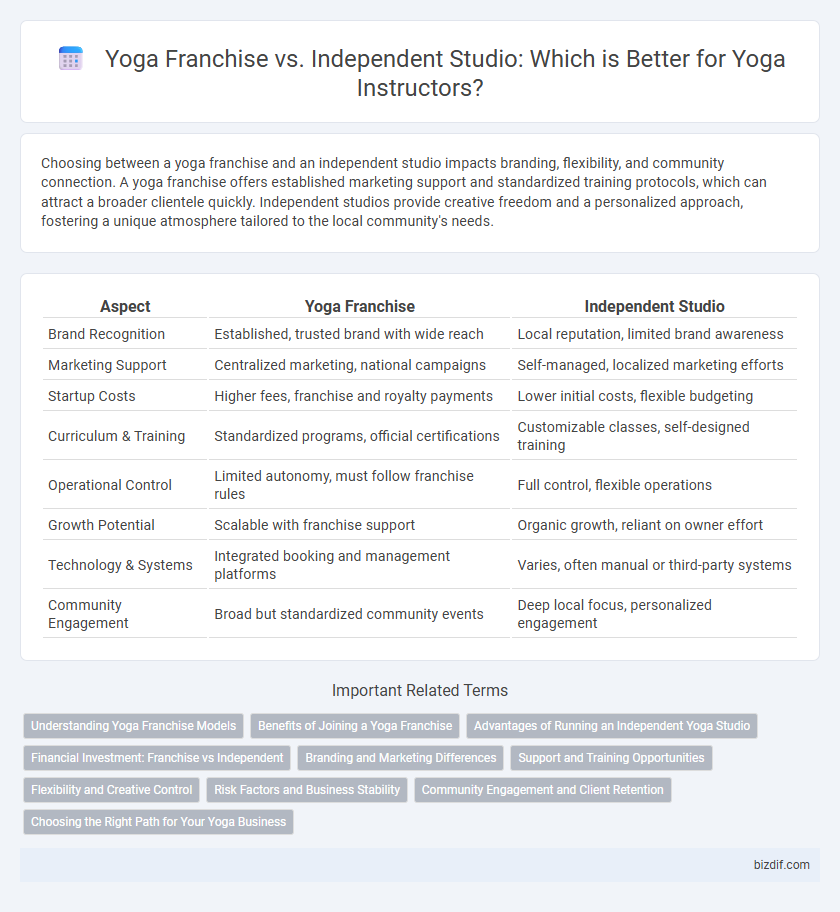Choosing between a yoga franchise and an independent studio impacts branding, flexibility, and community connection. A yoga franchise offers established marketing support and standardized training protocols, which can attract a broader clientele quickly. Independent studios provide creative freedom and a personalized approach, fostering a unique atmosphere tailored to the local community's needs.
Table of Comparison
| Aspect | Yoga Franchise | Independent Studio |
|---|---|---|
| Brand Recognition | Established, trusted brand with wide reach | Local reputation, limited brand awareness |
| Marketing Support | Centralized marketing, national campaigns | Self-managed, localized marketing efforts |
| Startup Costs | Higher fees, franchise and royalty payments | Lower initial costs, flexible budgeting |
| Curriculum & Training | Standardized programs, official certifications | Customizable classes, self-designed training |
| Operational Control | Limited autonomy, must follow franchise rules | Full control, flexible operations |
| Growth Potential | Scalable with franchise support | Organic growth, reliant on owner effort |
| Technology & Systems | Integrated booking and management platforms | Varies, often manual or third-party systems |
| Community Engagement | Broad but standardized community events | Deep local focus, personalized engagement |
Understanding Yoga Franchise Models
Yoga franchise models offer structured business frameworks, standardized branding, and established marketing support that streamline studio setup and attract clientele quickly. Independent studios maintain complete creative control and flexibility in class offerings but face higher risks and challenges in brand recognition and operational support. Evaluating franchise fees, royalty structures, and training programs is essential to understanding the financial and operational commitments within yoga franchise models.
Benefits of Joining a Yoga Franchise
Joining a yoga franchise offers standardized training programs, proven business models, and extensive brand recognition, which can accelerate client acquisition and trust. Franchisees benefit from ongoing marketing support, access to a larger network of professionals, and centralized technology systems that streamline scheduling and payments. These advantages reduce startup risks and operational burdens compared to independent studios, allowing instructors to focus more on delivering high-quality yoga classes.
Advantages of Running an Independent Yoga Studio
Running an independent yoga studio offers unparalleled creative freedom to design unique class styles and curate personalized client experiences that reflect the instructor's vision. Financially, independent studios retain full control over pricing, branding, and revenue without franchise fees or profit sharing, maximizing profitability. Building a local community and establishing authentic connections fosters long-term client loyalty, strengthening the studio's reputation and sustainability.
Financial Investment: Franchise vs Independent
Investing in a yoga franchise typically requires higher initial capital due to franchise fees, marketing costs, and royalty payments, while independent studios offer more flexible, lower startup costs but demand significant personal financial risk and resource management. Franchise owners benefit from established brand recognition and support systems, potentially leading to faster return on investment compared to independent studios that must build their clientele and brand organically. Analyzing projected revenue streams and long-term profitability is crucial when deciding between the structured financial obligations of a franchise and the autonomous but unpredictable investment landscape of an independent yoga studio.
Branding and Marketing Differences
Yoga franchises benefit from established brand recognition and unified marketing strategies that drive higher customer trust and streamlined promotional efforts. Independent studios rely on localized, personalized branding that emphasizes unique community connections and tailored experiences, allowing for flexibility in creative marketing approaches. Franchises often have centralized advertising resources, whereas independent studios invest in grassroots marketing and social media engagement to build a loyal client base.
Support and Training Opportunities
A yoga franchise offers structured support and comprehensive training programs, including standardized lesson plans, marketing strategies, and ongoing staff development, ensuring consistent quality and brand recognition. Independent studios typically have greater flexibility in curriculum design and teaching style but need to independently source training resources, business advice, and marketing solutions. The choice between the two depends on the importance placed on established support systems versus creative and operational autonomy.
Flexibility and Creative Control
Yoga franchises offer structured programs and brand recognition, providing consistent marketing and operational support that limits creative freedom but ensures a proven business model. Independent studios allow complete flexibility to design unique class formats, schedules, and branding, fostering personalized client experiences and innovation in teaching styles. Choosing between a franchise and an independent studio depends on balancing creative autonomy with the desire for established systems and scalability.
Risk Factors and Business Stability
Yoga franchises offer structured support and established brand recognition, reducing initial business risks and enhancing financial stability through proven operational models. Independent studios face higher risks due to market competition and marketing challenges but benefit from greater creative autonomy and the potential for unique brand development. Evaluating factors such as upfront investment, ongoing fees, and local market demand is crucial for anticipating long-term business viability.
Community Engagement and Client Retention
Yoga franchises benefit from extensive brand recognition and standardized community programs that enhance client retention through consistent engagement across multiple locations. Independent studios foster deeper local connections by tailoring classes and events to the specific interests and needs of their community, often resulting in highly personalized client relationships. Both models prioritize community engagement but differ in scale and customization, impacting long-term client loyalty uniquely.
Choosing the Right Path for Your Yoga Business
Choosing between a yoga franchise and an independent studio depends on your business goals, budget, and desire for creative control. A yoga franchise offers established brand recognition, standardized training programs, and marketing support, which can accelerate growth and reduce startup risks. An independent studio allows for personalized class offerings, unique branding, and flexible management, appealing to entrepreneurs seeking full autonomy and a distinct community presence.
Yoga Franchise vs Independent Studio Infographic

 bizdif.com
bizdif.com